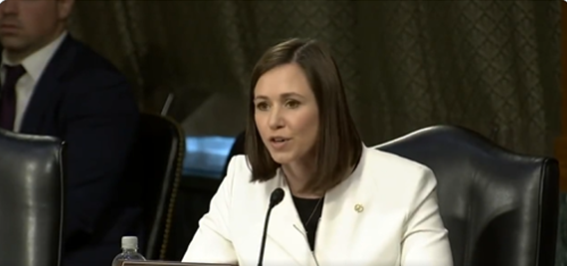Katie Britt and colleagues want to redesignate Iran-Backed Houthis as a foreign terrorist organization

On Monday, U.S. Senator Katie Britt (R-Alabama) joined in a letter urging the Biden Administration and Secretary of State Anthony Blinken to redesignate Ansarallah, more commonly known as the Houthis, as a foreign terrorist organization (FTO). Sen. Britt cited their longstanding acts of terrorism, actions to destabilize the Middle East, the security threat they pose to the United States, and most recently, their involvement in the ongoing conflict in Israel, including missile and rocket attacks on Israel last week. The Houthis control a large swath of war-torn Yemen. In 2021, the Trump Administration designated the Houthis as an FTO. However, the Biden Administration inexplicably reversed that following Biden’s inauguration. The Houthis are longtime Iranian clients who, thanks to that relationship, have amassed one of the most sophisticated arsenals of ballistic missiles and drones in the region. This has become apparent in their frequent attacks on Israel as well as U.S. partners and interests. “An ongoing posture of appeasement by the Biden Administration only emboldens the Iranian regime to continue its barbaric proxy attacks on innocent children, women, and men, and this is evidenced in the Houthi’s recent terrorist attacks that have been intercepted by defensive actions by the United States and Saudi Arabia,” said Senator Britt. “It is imperative that America sends a message of complete condemnation of Iran and its proxies’ violence, as well as unwavering support toward our allies in the region. The Houthis are a terrorist organization, and this Administration should treat them as such while reimposing a comprehensive, maximum pressure sanctions campaign on all Iranian terror proxies. In order to achieve peace, now is the time for strength.” Last week Sen. Britt joined Senator Steve Daines (R-Montana) and 12 of their Senate colleagues in introducing the Standing Against Houthi Aggression Act. This legislation would redesignate the Houthis as a foreign terrorist organization and impose certain sanctions on the group. The legislation has also been cosponsored by Senators Roger Marshall (R-Kansas), Bill Hagerty (R-Tennessee), Susan Collins (R-Maine), Joni Ernst (R-Iowa), Marco Rubio (R-Florida), Roger Wicker (R-Mississippi), John Barrasso (R-Wyoming), Cynthia Lummis (R-Wyoming), Bill Cassidy (R-Louisiana), Shelley Moore Capito (R-West Virginia), Pete Ricketts (R-Nebraska), and John Kennedy (R-Louisiana). Katie Britt was elected to the U.S. Senate in 2022. To connect with the author of this story or to comment, email brandonmreporter@gmail.com
Katie Britt and colleagues call for increased funding for Nonprofit Security Grant Program

On Wednesday, U.S. Senator Katie Britt (R-Alabama) announced that she has recently joined Senators Chris Murphy (D-Connecticut), Chairman of the U.S. Senate Appropriations Subcommittee on Homeland Security, Cory Booker (D-New Jersey), Jacky Rosen (D-Nevada), and Shelley Moore Capito (R-West Virginia.) in calling for additional funding for FEMA’s Nonprofit Security Grant Program (NSGP) to be included in any supplemental funding package Congress may consider amid heightened concerns about the safety and security of the American Jewish community following this weekend’s attacks on Israel by Hamas and Hezbollah. The NSGP, which is funded through the U.S. Department of Homeland Security, provides funding support for target hardening and other physical security enhancements to nonprofit organizations, including synagogues and other places of worship, that are at high risk of terrorist attack. “The barbaric attacks on innocent children, women, and men in Israel are heartbreaking and stomach-turning,” said Senator Britt in a statement. “Now more than ever, we must be unequivocally strong in our response and unreservedly clear in our purpose. As I work with colleagues on both sides of the aisle in the days, weeks, and months ahead to ensure Israel has everything it needs to defend itself with overwhelming force, we must also vigilantly guard against terrorism and the forces of hate here at home. I support robust funding for the Nonprofit Security Grant Program to help secure our homeland and keep our families, places of worship, and communities safe.” “The horrific images and videos we are seeing out of Israel are unspeakable, and I am doing everything in my power to ensure Israel gets the support it needs to defend itself. As Chairman of the Senate Appropriations Subcommittee on Homeland Security,” said Sen. Murphy. “I am also focused on making sure our Jewish community at home is protected from a potential rise in anti-Semitic threats. As Congress considers emergency supplemental legislation in the coming weeks, we must include increased funding for DHS’s Nonprofit Security Grant Program to help safeguard the Jewish Community here at home.” Booker was in Israel at the time of the attack and experienced the rockets up in the sky raining down while jogging before he was whisked away to a shelter by his staff. “The harrowing images coming out of Israel and the rising toll of confirmed deaths and number of civilians being held hostage by Hamas — including American citizens — are devastating and remind us that we cannot ignore the rise in antisemitism around the world or here at home,” said Sen. Booker. “It’s crucial that we take every precaution to keep all of our religious communities safe. In addition to providing security assistance to Israel, Congress should increase funding for the Department of Homeland Security’s Nonprofit Security Grant Program, which provides important resources to safeguard nonprofits that are at an increased risk of violence, including Jewish houses of worship and other religious-affiliated groups across the country.” “The hearts of all Americans are shattered after seeing Hamas’s deadly terrorist attacks on Israel,” said Sen. Rosen. “As we witness a surge in antisemitic activity worldwide, we must make sure that Jewish Americans are protected from the threat of antisemitism. As co-chair of the bipartisan Senate Task Force for Combating Antisemitism, I’m working with my colleagues on both sides of the aisle to increase funding for the life-saving Nonprofit Security Grant Program. This critical funding ensures that synagogues, community centers, and other nonprofits have the resources needed to protect themselves from targeted violence.” “Throughout my time on the Homeland Security Appropriations Subcommittee, I have seen and learned about the need so many have for funds through this program,” said Sen. Capito. “Ensuring its inclusion in a supplemental further confirms our commitment to the safety and security for communities of faith, particularly synagogues across the nation that are too often the target of threats.” While Gaza is halfway around the world, Hamas has many supporters worldwide, including in the U.S., as evidenced by the protests that popped up in cities across the U.S. celebrating the Hamas attacks while they were ongoing. The Hamas attacks on Jewish civilians in Israel and the likely Israeli counteroffensive against Hamas and the Gaza Strip may only embolden antisemitism in the U.S. and abroad. In 2019, five men were stabbed at a Hanukkah service in New York. In 2022, an armed man took hostages at a synagogue in Texas. Sen. Britt was elected to the Senate in 2022. She has already visited Israel in her Senate duties. To connect with the author of this story or to comment, email brandonmreporter@gmail.com.
Katie Britt and Pete Ricketts want Senate to remain in session until all appropriations bills are passed

On Thursday, U.S. Senator Katie Britt (R-Alabama) announced that she has joined Senator Pete Ricketts (R-Nebraska) and 15 of their Senate colleagues in sending a letter urging Senate Majority Leader Chuck Schumer (D-New York) to keep the U.S. Senate in session until all 12 of the appropriations bills have been debated on the floor and passed. To this point, Schumer has resisted bringing the appropriations bills to the floor even though they have all passed out of the Appropriations Committee. The federal government narrowly averted a shutdown at the end of the fiscal year last weekend with a 45-day continuing resolution (CR) that will run through November 17. “We urge you to modify the Senate calendar so that we remain in session Monday through Friday every week until all 12 fiscal year 2024 appropriations bills are passed in the Senate and House and signed into law by President Biden,” the Senators wrote. “The House of Representatives has already taken the step to forgo their October recess, and the Senate must follow suit. While valuable work is done while Senators are back in their home states, it is imperative that we remain in D.C. until our appropriations work can be completed. That is what the American people expect and deserve of us.” “The continuing resolution extended government funding until November 17,” the Senators continued. “That allows seven weeks for the Senate to consider the fiscal year 2024 appropriations bills. The past nine weeks make it clear that we cannot afford to take a weekday off, much less a weeklong recess, with so much work to be completed in such a condensed time.” “My colleagues and I have worked hard this year to advance all 12 individual appropriations bills out of committee through regular order,” the Senators continued. “However, in order to enact judicious, strategic, transparent, and accountable spending measures that benefit the American people, it’s incumbent on Senator Schumer to utilize a novel concept – actually making the Senate work,” said Senator Britt. “Alabamians know this is simply common sense, but that is unfortunately uncommon in Washington, D.C.” Joining Senators Britt and Ricketts in sending the letter were Senators Deb Fischer (R-Nebraska), John Barrasso (R-Wyoming), Marsha Blackburn (R-Tennessee), Ted Budd (R-North Carolina), Shelley Moore Capito (R-West Virginia), John Cornyn (R-Texas), Bill Hagerty (R-Tennessee), Ron Johnson (R-Wisconsin), Roger Marshall (R-Kansas), Markwayne Mullin (R-Oklahoma), Rick Scott (R-Florida), Eric Schmitt (R-Missouri), John Thune (R-South Dakota), Thom Tillis (R-North Carolina), and Roger Wicker (R-Mississippi). The 2023 fiscal year ended on September 30, and Congress still has not passed the 2024 budget. If the current 45-day CR runs out without Congress having passed a budget or another CR, then the federal government will have to shut down non-essential services. Majority Leader Schumer has scheduled the Senate to be in recess until October 16. The Senate was also not in session the entire month of August, even though budgets had not been passed. To connect with the author of this story or to comment, email brandonmreporter@gmail.com
Katie Britt chastises Joe Biden over creating a border that is a “national security threat of epic proportion”

U.S. Senator Katie Britt (R-Alabama) joined a group of colleagues this week at a press conference to highlight their concerns about the Biden Administration’s border policies. The Senators claim that Joe Biden’s continued denial of this national security crisis has incentivized illegal immigration and created a safe haven for terrorists. The press conference was led by Senator Bill Hagerty (R-Tennessee) and included Senators John Cornyn (R-Texas), John Barrasso (R-Wyoming), Shelley Moore Capito (R-West Virginia), Ted Budd (R-North Carolina), Joni Ernst (R-Iowa), John Hoeven (R-North Dakota), and Ron Johnson (R-Wisconsin). “If you look back over his administration, there have been 2.3 million people that have come here (last fiscal year alone),” said Sen. Britt in the press conference. “Guys, you need to put that in perspective. Alabama is the 24th largest state in the nation, and that is about half of our population of 5 million. That was the last fiscal year alone. If you look at the total compilation to this point in his administration, we’re at about 7 million.” “To what you heard earlier from my colleagues, we’re hitting about 9,000 migrants at our border a day,” Sen. Britt continued. “At the current rate, we will hit 3 million in this next fiscal year alone. That’s over 10 million migrants who have come here illegally, across our border, during President Biden’s tenure.” “Over 844 people died at the border last year, and you all read the story about an 8-year-old drowning,” Britt continued. “As a mom, that is completely and totally gut-wrenching and unacceptable. I have talked to women who have not just told me that they were raped, but they’ve told me how many times a day they were raped at the hands of the drug cartels.” “You look at the drug cartels and what they’ve done with fentanyl in every community around this great nation,” Britt said. “Last year alone in Alabama, we had to use Narcan 15 times the first two months of our school year because of overdoses on campus. There is a mom, a dad, a brother, a sister, a cousin who is sitting around a dining room table tonight who is missing somebody because President Biden will not do his job.” “And then you look at terrorists,” said Britt. “The numbers here don’t lie guys. Look at the last administration. The last administration, in that total time span of those four years, do you know how many people we found on the wanted terrorist watch list at the border? Eight. Do you know how many people on the terrorist watch list that we have caught at the border in the [current] fiscal year alone? And we’re not finished yet. 244.” “We have a national security threat of epic proportion [on] our border; yet, at the same time, this White House is so unserious about it, that they’re actually proposing to defund ICE as a condition to continue to keep the government open beyond September 30,” Sen. Hagerty said. “If you don’t believe me, take a look at page 51 of the language that is appended to their ‘clean CR.’ On page 51, it gives them the authority to reprogram all of ICE’s funding, over $8 billion, to reprogram that and turn ICE into a resettlement agency. All of these funds can be reprogrammed to more rapidly push people into America. Instead of buying plane tickets to send people that have come here illegally—often many of them with violent criminal records—instead of buying plane tickets to send them back to their home country, ICE will now be buying plane tickets to send them to a town near you or me. This is egregious. It’s got to stop, and I’m glad that my colleagues have joined me today to bring attention to what’s happening at our southern border.” Britt has made border security a top focus during her first several months in office. Recently, she joined Senator Ted Cruz (R-Texas) and 25 colleagues in introducing the Secure the Border Act. Katie Britt is the Ranking Member of the Homeland Security Subcommittee for the Senate Committee on Appropriations. She was elected to the Senate in 2022. To connect with the author of this story or to comment, email brandonmreporter@gmail.com.
Katie Britt and colleagues demand answers after Biden Administration hands over $6 billion to Iran

On Monday, U.S. Senator Katie Britt (R-Alabama) joined a letter by Sen. Tim Scott (R-South Carolina), the ranking member of the Senate Committee on Banking, Housing, and Urban Affairs, and 24 of her Republican colleagues in demanding answers from the Biden Administration about the approximately $6 billion reportedly paid to Iran in exchange for Americans wrongfully being held as political hostages by the Iranian regime. “Handing $6 billion to the world’s largest state sponsor of terrorism is a reckless and disastrous decision that threatens the lives of Americans and our allies across the globe,” said Senator Britt. “Once again, the Biden Administration has chosen to appease our adversaries and set a dangerous precedent. President [Joe] Biden’s weakness will only embolden hostile actors to engage in further aggression around the world. We must achieve peace through strength, and I will always fight to hold this Administration accountable for putting American families at risk.” In a letter to Secretaries Antony Blinken and Janet Yellen, the senators wrote, “When the Obama administration released $400 million in liquidated assets to Iran in 2016, we warned that this dangerous precedent would put a price on American lives. Seven years later, the current administration is providing a ransom payment worth at least fifteen times that amount to the world’s largest state sponsor of terror, in yet another violation of the United States’ long-standing ‘no concessions’ policy. In the release of Executive Order 14078 on July 19, 2022, the White House admitted that ‘terrorist organizations, criminal groups, and other malicious actors who take hostages for financial, political, or other gain—as well as foreign states that engage in the practice of wrongful detention, including for political leverage or to seek concessions from the United States—threaten the integrity of the international political system and the safety of United States nationals and other persons abroad.’ The release of such a significant sum to the Iranian regime runs entirely counter to that claim and will only serve to encourage additional hostage-taking for financial or political gain.” Joining Senators Britt and Scott on the letter were Senators Jim Risch (R-Wisconsin), Roger Wicker (R-Mississippi), Tom Cotton (R-Arkansas), Bill Hagerty (R-Tennessee), Bill Cassidy (R-Louisiana), Chuck Grassley (R-Iowa), Lindsey Graham (R-South Carolina), Steve Daines (R-Montana), Marsha Blackburn (R-Tennessee), Kevin Cramer (R-North Dakota), Ted Budd (R-North Carolina), J.D. Vance (R-Ohio), John Cornyn (R-Texas), Joni Ernst (R-Iowa), Pete Ricketts (R-Nebraska), John Hoeven (R-North Dakota), Todd Young (R-Indiana), Mike Crapo (R-Idaho), Roger Marshall (R-Kansas), James Lankford (R-Oklahoma), Thom Tillis (R-North Carolina), John Kennedy (R-Louisiana), John Barrasso (R-Wyoming), and Shelley Moore Capito (R-West Virginia) After more than two years of quiet negotiations, Iran has released five Iranian American dual citizens into house arrest, according to original reporting by the New York Times – quoting officials at the State Department and the National Security Council. “This is just the beginning of a process that I hope and expect will lead to their return home to the United States,” Secretary of State Antony Blinken said on Thursday. “There’s more work to be done to actually bring them home. My belief is that this is the beginning of the end of their nightmare.” The prisoners are Siamak Namazi, Emad Sharghi, and Morad Tahbaz, who had all been jailed on unsubstantiated charges of spying, as well as two others whose families have withheld their names. One of the unnamed Americans is a scientist, and the other is a businessman, according to sources. In addition to releasing the $6 billion in seized oil funds, the U.S. has agreed to hand over imprisoned Iranians as part of the prisoner swap. Britt and her colleagues had objected to paying the ransom before the deal had been finalized. Britt was elected to the Senate in 2022. To connect with the author of this story or to comment, email brandonmreporter@gmail.com.
Katie Britt and colleagues introduce the Back the Blue Act

On Monday. U.S. Senator Katie Britt joined U.S. Senator John Cornyn, U.S. Senator Tommy Tuberville, and 37 Republican colleagues to introduce the Back the Blue Act. The announcement coincided with the annual observance of Peace Officers Memorial Day and National Police Week. This legislation will strengthen existing laws that protect police officers, increase the criminal penalties for individuals who target law enforcement, and expand the tools that police can use to protect themselves. “Today, we honor the courageous law enforcement officers who have valiantly made the ultimate sacrifice,” Sen. Britt said. “Every single day, the brave men and women of law enforcement go above and beyond to serve and protect our communities. It is essential that we not only support our police, but we respect the rule of law in our country. I’m proud to join Senator Cornyn and my colleagues in introducing the Back the Blue Act, and I will always stand with our police officers in Alabama and across the country.” “The Back the Blue Act adds stiff, mandatory penalties and makes it a federal crime to kill – or attempt to kill – a law enforcement officer, a federal judge, or a federally funded public safety officer,” Sen. Cornyn said. “We must make it absolutely clear that violence against them will not be tolerated. In honor of National Police Week, we honor the brave men and women who protect us, we pay tribute to those who made the ultimate sacrifice, and we commit to doing everything in our power to ensure that they have all the resources they need to keep our people safe.” “Today marks the start of National Police Week,” Sen. Tuberville said on Twitter. “America’s brave men and women in blue wake up every day prepared to sacrifice their own safety in service to their fellow Americans. It is more important than ever that we show our support. To all who protect and serve, thank you.” In addition to Senators Britt, Tuberville, and Cornyn, this legislation is cosponsored by Senate Minority Leader Mitch McConnell (R-Kentucky), Senate Judiciary Committee Ranking Member Lindsey Graham (R-South Carolina), and Senators Ted Cruz, Thom Tillis, Rick Scott, Jerry Moran, Mike Braun, Kevin Cramer, Marsha Blackburn, John Boozman, Deb Fischer, Shelley Moore Capito, Mike Crapo, Marco Rubio, Jim Risch, Pete Ricketts, Steve Daines, John Barrasso, James Lankford, Cindy Hyde-Smith, John Kennedy, Tom Cotton, John Thune, John Hoeven, Ted Budd, Josh Hawley, Tim Scott, Bill Hagerty, Roger Marshall, Bill Cassidy, Joni Ernst, Chuck Grassley, Todd Young, Eric Schmitt, Cynthia Lummis, and Roger Wicker. The Back the Blue Act has been introduced in Congress multiple times since 2017. Senator Britt is also a cosponsor of Senator Braun’s Thin Blue Line Act, which expands the list of statutory aggravating factors in capital punishment determinations to also include killing or targeting a law enforcement officer, firefighter, or other first responders. To connect with the author of this story or to comment, email brandonmreporter@gmail.com
Reps. Terri Sewell and Mike Rogers introduce bipartisan legislation to address Alabama’s rural wastewater issues

On Thursday, Congressmembers Terri Sewell and Mike Rogers introduced bipartisan legislation that would help households install or upgrade wastewater systems through a USDA grant program. The Rural Decentralized Water Systems Reauthorization Act would help combat Alabama’s rural wastewater crisis by strengthening and expanding the existing United States Department of Agriculture (USDA) Rural Decentralized Water Systems Program. The already existing program provides grants to help low- and moderate-income households install or upgrade individually-owned decentralized wastewater systems. Companion legislation was introduced in the U.S. Senate by Sens. Cory Booker and Shelley Moore Capito. “Access to adequate wastewater infrastructure is a basic human right, but for too many of my constituents, generations of disinvestment have created broken and failing wastewater systems that put the health of our communities at risk,” said Rep. Sewell. “The Rural Decentralized Water Systems Reauthorization Act is an important step toward correcting this injustice. Many communities in the Black Belt have received USDA Rural Water and Waste Disposal Program grants to help households install and upgrade their wastewater systems. By reauthorizing and expanding this program, more rural and underserved communities will receive the wastewater infrastructure resources that they deserve.” “I am excited to join my colleague and friend from the great state of Alabama to reintroduce this important legislation,” said Rep. Rogers. “I was especially proud to work in a bipartisan and bicameral manner to address the universal issue of our country’s failing rural wastewater infrastructure. Reauthorizing this grant program will ensure access to clean water for more rural communities in Alabama and across the country.” “Water is a basic human right, and access to safe, clean water should never be determined based on one’s socioeconomic status,” said Sen. Booker. “We must ensure that all Americans have access to reliable water well and wastewater systems to prevent health hazards in communities where water contamination is a real threat. That is why I am proud to join my colleagues in introducing this bill that would expand and strengthen the USDA Rural Decentralized Water Systems Program to provide support to more low- and moderate-income households to modernize their outdated wastewater systems.” “Strengthening our infrastructure throughout West Virginia has been and remains a top priority of mine,” said Sen. Capito. “I’m glad to join Senator Booker in reintroducing legislation that will help improve home water systems in West Virginia and reauthorize the Rural Decentralized Water Systems Grant Program that has proven to work in my state. This legislation is also included in my list of Farm Bill priorities this year, and I look forward to working to advancing it.” Approximately 20 percent of Americans dispose of wastewater through their own sewage disposal systems. Because these systems have high maintenance costs, certain failures often go unaddressed, potentially endangering the health of millions of Americans living in areas where water can be contaminated as a result of homes that lack a sewage system altogether or have a failing, improperly installed, or homemade septic system. The problem is particularly dire in parts of rural Alabama where—in the absence of municipal wastewater systems—many families have struggled to afford the installation and maintenance costs associated with individually owned wastewater systems. The Rural Decentralized Water Systems Reauthorization Act: · Reauthorizes the Rural Decentralized Water Systems Grant Program through 2028 · Reinstates eligibility for loans to individuals earning up to 100 percent of the area median income. · Targets funding through subgrants to individuals earning 60 percent or less of the area median income. · Increases the maximum subgrant or loan amount from $15,000 to $20,000. · Allows subgrant funding to include the cost of a performance warranty for individually owned household decentralized wastewater systems. The Rural Decentralized Water Systems Reauthorization Act has been endorsed by the National Onsite Wastewater Recycling Association (NOWRA) and the Rural Community Assistance Partnership (RCAP). The federal government is already in the process of pouring billions of dollars into improving, modernizing, and in some cases, installing both freshwater and wastewater systems around the country, including in Alabama. To connect with the author of this story or to comment, email brandonmreporter@gmail.com.
Katie Britt and Tommy Tuberville join bipartisan group to support rural hospitals

On Friday, U.S. Senators Katie Britt and Tommy Tuberville joined a bipartisan group of fourteen Senators urging the extension of a policy that is helping rural hospitals in states like Alabama continue to deliver quality care. The two Alabama Republicans joined in a letter to Centers for Medicare and Medicaid Services (CMS) Administrator Chiquita Brooks-LaSure formally requesting a four-year extension of the Low Wage Index Hospital Policy, which allows hospitals in rural areas to compete for and retain high-quality staff by increasing reimbursements to hospitals in rural areas with lower overall wages. Without action, Medicare payments to these hospitals will reduce after September 30, 2023. Sen. Britt is a member of the subcommittee for Labor, Health and Human Services, Education, and Related Agencies of the Senate Committee on Appropriations. “Our rural families and communities depend on the medical services and potentially life-saving treatments that local hospitals provide,” said Sen. Britt. “Every Alabamian deserves access to quality care and the opportunity to thrive in safe, strong communities – no matter their zip code.” The four-year AWI adjustment by CMS for bottom quartile hospitals was first passed by the Trump administration in August 2019. Then, Sens. Richard Shelby and Doug Jones represented Alabama in the Senate. “For two decades, Alabama has been fighting the unfair Medicare reimbursements and today receives a rate that is just 67 percent of the national average,” Sen. Jones explained in 2019. “This rule adjustment will bring balance to Medicare reimbursement for Alabama, particularly our rural hospitals and hospitals across the country,” explained then-Sen. Shelby. “For years, I’ve been working with Alabama’s hospitals and the delegation to advocate for increased Medicare reimbursements for Alabama’s hospitals, which are currently reimbursed at the lowest rates in the country,” Congresswoman Terri Sewell stated when the rule was passed. “Today’s announcement is great news for Alabama’s hospitals, especially those in rural areas of the state where every dollar counts. With over 88 percent of rural Alabama hospitals operating in the red, it is critical that we do everything we can to help our hospitals provide the services needed to keep Alabamians healthy. Recalculating the way Medicare reimburses Alabama hospitals is a crucial step in achieving that goal.” “Unfortunately, due to disruptions in the marketplace caused by the COVID-19 pandemic, we have not had the opportunity to see the true impact of the Low Wage Index Hospital Policy envisioned by CMS,” the Senators wrote in their letter. “Extending the Low Wage Index Hospital Policy for four additional years will allow hospitals and the agency to better understand the policy’s true impact in a more normal environment.” Senators Britt and Tuberville were joined by Senators Mark Warner (D-Virginia), Marsha Blackburn (R-Tennessee), Tim Kaine (D-Virginia), Joe Manchin (D-West Virginia), John Boozman (R-Arkansas), Shelley Moore Capito (R-West Virginia), Roger Wicker (R-Mississippi), Cindy Hyde-Smith (R-Mississippi), Bill Hagerty (R-Tennessee), James Lankford (R-Oklahoma), Tim Scott (R-South Carolina), and Tom Cotton (R-Arkansas). Without a renewal and extension of the rule, CMS will revert back to compensating rural hospitals at 60 to 75% of the rates as hospitals in many major metropolitan areas based on the assumption that the cost of living and, thus, wages are less in the rural areas. The difficulty with that theory is that there is an intense nationwide competition for medical professionals who all go to the same medical and nursing schools. Rural hospitals already struggle to hire competent medical professionals due to the small rural populations. This means fewer patients seeking care, particularly specialized care, than in a major city hospital. If Medicare and Medicaid reimburse those hospitals for significantly less than the major hospitals will, then attracting and retaining staff at the rural hospitals becomes problematic. To connect with the author of this story or to comment, email brandonmreporter@gmail.com.
Katie Britt and Shelley Capito lead challenge to Joe Biden’s Waters of the U.S. rule

U.S. Senators Katie Britt and Tommy Tuberville joined Sen. Shelley Moore Capito and all of their Senate Republican colleagues introduced a formal challenge to the Biden Administration’s Waters of the United States (WOTUS) rule through a Congressional Review Act (CRA) joint resolution of disapproval. If both Houses of Congress pass a resolution rejecting a federal regulation under the CRA, that regulation is effectively nullified. This resolution comes after Joe Biden’s Environmental Protection Agency (EPA) and the U.S. Army Corps of Engineers announced a new rule in December 2022 repealing the Navigable Waters Protection Rule (NWPR), changing the definition of Waters of the United States in a way that will significantly expand federal regulatory authority over farmers, foresters, builders, developers, businesses, and even homeowners. “The Biden Administration in two years has racked up more regulations than the Obama Administration did in eight years,” Sen. Britt said. “They’re continuing their red tape regime with yet another reckless rulemaking decision that would prioritize their leftwing political agenda at the expense of hardworking Americans. This type of job-killing overregulation would strangle Alabama farmers, cattlemen, manufacturers, energy producers, builders, landowners, and small businesses.” “Alabamians have tended to our own land, waterways, and resources for generations, and we remain best positioned to preserve and utilize them for generations to come,” Britt said. Sen. Shelley Moore Capito is the Ranking Member of the Senate Environment and Public Works (EPW) Committee. “With its overreaching navigable waters rule, the Biden administration upended regulatory certainty and placed unnecessary burdens directly on millions of Americans,” stated Capito. “This Congressional Review Act resolution of disapproval will give every member of Congress the chance to stand with farmers, ranchers, landowners, and builders, and protect future transportation, infrastructure, and energy projects of all kinds in their states. I appreciate the widespread support we’ve received in both the Senate and House, and across the country, as we fight to place an important check on this misguided overreach from the Biden administration.” As Senator Capito introduced the CRA resolution in the Senate, U.S. Rep. Sam Graves, the Chairman of the House Committee on Transportation and Infrastructure (T&I), simultaneously introduced an identical resolution in the House. “As American families and businesses continue suffering under the economic crises caused by the disastrous Biden policies of the last two years, this Administration has inexplicably decided to move the country back toward the costly and burdensome WOTUS regulations of the past,” said Chairman Graves. “In an unnecessary drain on federal resources, the Administration clumsily put forward its rule before the Supreme Court has issued a ruling in the Sackett case, which will affect and alter what the Administration has put forward. Congress has the authority and responsibility to review onerous rules like this one handed down from the Executive Branch, and I hope our colleagues on both sides of the aisle will join in this effort to preserve regulatory clarity and prevent overzealous, unnecessary, and broadly defined federal power.” Numerous industry leaders and stakeholders have issued statements supporting the effort to overturn this rule. “As farmers, we want and need to protect the nation’s waters,” Alabama Farmers Federation President Jimmy Parnell said. “This rule muddies the water for property owners, will make conservation more difficult, and will create huge liabilities for farmers.” American Farm Bureau Federation (AFBF) President Zippy Duvall said, “Farmers and ranchers are committed to protecting the land and water they rely on to grow food for America’s families. Unfortunately, the back and forth over water regulations threatens the progress made to responsibly manage natural resources. We appreciate Congressmen Sam Graves, David Rouzer, and Senator Shelley Moore Capito for introducing a joint resolution to use the Congressional Review Act to stop the new Waters of the U.S. rule from going into effect. Farmers deserve rules that don’t require a team of attorneys and consultants to identify ‘navigable waters’ on their land.” The American Pipeline Contractors Association (APCA) said, “The American Pipeline Contractors Association is grateful for the introduction of this Congressional Review Act resolution and urges Congress to come together and swiftly overturn the new burdensome and unnecessary WOTUS regulations. There is widespread understanding in Washington that permitting reforms and regulatory overhaul are necessary to meet infrastructure goals and unlock the full potential of American energy, but this decision from the administration directly contradicts those goals. APCA urges the Biden administration to roll back this regulation as soon as possible and to instead work with Congress to undertake meaningful action toward reforming pipeline and general construction permitting processes.” American Road & Transportation Builders Association Vice President of Legal & Regulatory Issues Nick Goldstein said, “The recent Waters of the United States definition from the Environmental Protection Agency (EPA) would add more delay and confusion to the delivery of critical transportation improvements. By muddying federal Clean Water Act jurisdiction, EPA’s regulation directly contradicts the bipartisan infrastructure law’s goal of improving the project review and approval process. That’s why ARTBA supports House and Senate legislation to rescind the WOTUS rule.” Associated General Contractors of America (AGC) Vice President of Government Relations Jimmy Christianson said, “Senate Environment and Public Works Committee Ranking Member Shelley Moore Capito and House Transportation and Infrastructure Committee Chairman Sam Graves are right to express disapproval with the administration’s overreach and expansion of the waters of the United States regulatory program. AGC is disappointed that the agencies rushed through the sixth change in the requirements, in almost as many years, just as the U.S. Supreme Court is poised to decide on a related case. Employers try in good faith to keep pace with ever-shifting requirements that carry criminal as well as civil penalties for noncompliance.” Energy Marketers of America (EMA) President Rob Underwood said, “The Energy Marketers of America (EMA) recognize the enormous impacts the Biden Administration’s ‘Waters of the United States’ rule will place on small business energy marketers. In large part, WOTUS will determine whether costly land use restrictions will be imposed on new building or expansion projects, such as adding renewable liquid fuel pumps and/or electric charging stations. EMA supports the joint resolution of disapproval under the Congressional Review Act on the Biden Administration’s WOTUS rule.” Leading Builders of America CEO Ken Gear said,
Tommy Tuberville supports bill to permanently ban taxpayer funding for abortions

U.S. Senators Tommy Tuberville and Katie Britt joined 45 of their Senate colleagues in introducing the No Taxpayer Funding for Abortion Act to establish a permanent prohibition on federal funding for abortion. Tuberville said in a statement, “Every life is sacred.” “Millions of hardworking Americans believe that life begins at conception and don’t want their taxpayer dollars inadvertently funding abortions,” said Sen. Tuberville stated. “As a Christian and as a conservative, I share their belief that every life is sacred and every American has a right to life. That’s why I’m proud to sign on to this legislation that will solidify abortion funding restrictions that have been in place for decades and better protect the unborn.” “Most Americans do not want their hard-earned tax dollars being used for abortion-on-demand, but our current patchwork of regulations has brought years of uncertainty,” Sen. Roger Wicker said. “The No Taxpayer Funding for Abortion Act would simplify federal rules, ensuring that American tax dollars are never used for the destruction of innocent, unborn life.” The bill seeks to change 40 years of inconsistent policies that have regulated federal funding for abortion. It would make funding restrictions permanent for abortion and elective abortion coverage, including the Hyde Amendment, which requires annual approval. The legislation would also eliminate taxpayer-funded subsidies for elective abortion coverage currently offered on Affordable Care Act exchanges through refundable tax credits. Tuberville, Wicker, and Britt joined Sens. Mitch McConnell (R-Kentucky) John Barrasso (R-Wyoming), Marsha Blackburn (R-Tennessee), John Boozman (R-Arkansas), Mike Braun (R-Indiana), Ted Budd (R-North Carolina), Shelley Moore Capito (R-West Virginia), Bill Cassidy (R-Louisiana), John Cornyn (R-Texas), Tom Cotton (R-Arkansas), Kevin Cramer (R-North Dakota), Mike Crapo (R-Idaho), Ted Cruz (R-Texas), Steve Daines (R-Montana), Joni Ernst (R-Iowa), Deb Fischer (R-Nebraska), Lindsey Graham (R-South Carolina), Chuck Grassley (R-Iowa), Bill Hagerty (R-Tennessee), Josh Hawley (R-Missouri), John Hoeven (R-North Dakota), Cindy Hyde-Smith (R-Mississippi), Ron Johnson (R-Wisconsin), John Kennedy (R-Louisiana), James Lankford (R-Oklahoma), Mike Lee (R-Utah), Cynthia Lummis (R-Wyoming), Roger Marshall (R-Kansas), Jerry Moran (R-Kansas), Markwayne Mullin (R-Oklahoma), Rand Paul (R-Kentucky), Pete Ricketts (R-Nebraska), Jim Risch (R-Idaho), Mitt Romney (R-Utah), Mike Rounds (R-South Dakota), Marco Rubio (R-Florida), Eric Schmitt (R-Missouri), Rick Scott (R-Florida), Tim Scott (R-South Carolina), Dan Sullivan (R-Alaska), Thom Tillis, (R-North Carolina), John Thune (R-South Dakota), J.D. Vance (R-Ohio), and Todd Young (R-Indiana). Swing Republican Sens. Lisa Murkowski and Susan Collins did not sign off on the legislation, and neither did any of the 52 Senate Democrats who hold the majority in the body. U.S. Representative Christopher Smith (R-New Jersey) has introduced similar legislation in the House of Representatives. To connect with the author of this story, or to comment, email brandonmreporter@gmail.com.
Sen. Katie Britt votes against confirming Brendan Owens

On Monday, U.S. Senator Katie Britt today cast her first-ever vote in the Senate; when she voted against the confirmation of Brendan Owens to serve as Assistant Secretary for Energy, Installations, and Environment in the Department of Defense. Owens was originally nominated by President Joe Biden in March 2022 but failed to muster the support to get a floor vote during the 117th Congress. President Biden re-nominated Owens in January 2023 at the start of the 118th Congress. “The Biden Administration has consistently prioritized their reckless leftwing political agenda to the detriment of our military readiness,” said Sen. Britt. “This nominee would simply be the tip of the spear in continuing President Biden’s radical ‘Green New Deal’ priorities at the Department of Defense, which should be focused on ensuring our incredible men and women in uniform are the best equipped, resourced, and trained in the world. We achieve peace through strength, not wokeness. The last thing we need is a DOD appointee from the ESG movement.” The U.S. Senate confirmed Owens on Monday night with 60 “yea” and 35 “nay” votes. A number of Republicans voted to confirm Owens, including Sens. Shelley Moore Capito of West Virginia, Susan Collins of Maine, John Cornyn of Texas, Joni Ernst of Iowa, Lindsey Graham of South Carolina, Chuck Grassley of Iowa, Mitch McConnell of Kentucky, Jerry Moran of Kansas, Mitt Romney of Utah, Mike Rounds of South Dakota, Thom Tillis of North Carolina, Roger Wicker of Mississippi, and Todd Young of Indiana. Britt was elected in a landslide by the voters of Alabama in November after besting four rivals in the Alabama Republican Primary last spring. Senate is the first elected office she has ever held. Britt and her husband, Wesley, live in Montgomery with their two children. To connect with the author of this story, or to comment, email brandonmreporter@gmail.com.
Tommy Tuberville objects to cuts to veterans pharmacy network

U.S. Senator Tommy Tuberville and 15 of his Senate colleagues sent a letter Friday to Seileen Mullen, Acting Assistant Secretary of Defense for Health Affairs, seeking answers about TRICARE beneficiaries’ ability to maintain access to local pharmacies. On October 24, unless the VA can reach a new agreements with Express Scripts and other providers, thousands of local community pharmacies will not be able to service 9.6 million TRICARE patients and their families. Express Scripts is terminating the contract with TRICARE on October 24 instead of waiting for them to expire at the end of the year, heightening concerns that millions of veterans and their families will not be able to get their medicines at their neighborhood pharmacies. “It has been brought to our attention that Express Scripts has reduced reimbursements for prescriptions dispensed at in-network retail pharmacies for 2023,” wrote Tuberville and the other Senators. “These reductions may leave many retail pharmacies unable to participate in the TRICARE Pharmacy Program, thus significantly impacting 9.6 million TRICARE beneficiaries’ access to local pharmacies. Most recently, Express Scripts notified pharmacies and beneficiaries that current 2022 pharmacy contracts will expire October 24, 2022, rather than the end of the year. This will only further reduce the pharmacy network for TRICARE patients and their families and may force beneficiaries to change pharmacies at a time when many receive annual vaccinations.” “Pharmacists continue to be one of the most accessible health care providers in the United States,” the Senators continued. “Over 90 percent of Americans live within five miles of a community pharmacy, and 76.5 percent of pharmacies in rural areas are independent community pharmacies. As you know, in addition to dispensing medications and vaccines, community pharmacies provide services that lead to better health outcomes, lower overall administrative fees, and valuable in-person consultations with a healthcare provider.” Tuberville was joined in the letter by Sens. Tom Cotton (R-Arkansas), Roger Marshall (R-Kansas), Cindy Hyde-Smith (R-Mississippi), Chuck Grassley (R-Iowa), Steve Daines (R-Montana), John Boozman (R-Arkansas), Marsha Blackburn (R-Tennessee), Shelley Moore Capito (R-West Virginia), John Thune (R-South Dakota), Jerry Moran (R-Kansas), Mike Rounds (R-South Dakota), John Barrasso (R-Wyoming), Deb Fischer (R-Nebraska), Mike Braun (R-Indiana), and Cynthia Lummis (R-Wyoming). 15,000 pharmacies will leave the TRICARE network on October 24. To connect with the author of this story, or to comment, email brandonmreporter@gmail.com.

